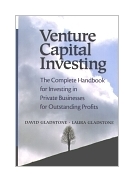|
||
• wydawnictwa polskie
• Zamów informacje o nowościach z wybranego tematu • kontakt
• Cookies na stronie |
VENTURE CAPITAL INVESTINGGLADSTONE D., GLADSTONE L.wydawnictwo: FT/PH , rok wydania 2004, wydanie Icena netto: This is the classic book on how to invest money in new ventures. Almost all of the books on the market that deal with venture capital discuss how entrepreneur's can raise venture capital. This book helps the other side of the process, the side that actually lays out the money to seed those entrepreneurs. Table of Contents What Are the Basic Items to Look for in a Business Proposition? It's Not an Investment, It's a Partnership. Prepare a Written Summary before You Begin to Invest. What Does A Summary Look Like? Some Words about Franchising. Summary Quick Standards of Venture Capital Investing.
The Study of Entrepreneurs. Characteristics of Entrepreneurs. How We See Entrepreneurs. Interviewing Entrepreneurs. Assessment of Entrepreneurs. What Venture Capitalists Look for in Entrepreneurs. Characteristics of Small Business Managers versus Entrepreneurs. Conclusions on Entrepreneurs. Developing Background Information. Final Judgment. 3. Reviewing Personnel and Compensation How Is the Company Organized? How Are People Compensated? What Employment Contracts Exist? What Is the Workforce Structure? What Personnel Records Are Maintained? Major Strengths and Weaknesses.
Who Are the People Who
Market and Sell? What Are They Selling? Who Buys the Product or Service? What Is Said to
the Customer? What Is the Marketplace for the Product or Service? How Is Price Determined?
What Internal Reports Are Made? What External Information Is Available? Basic Information.
What Are the Strengths and Weaknesses? The Facility. Equipment. Production Capacity. Production Employees. Regulatory Agencies. Subcontracting Work. Inventory. Quality Control. Production Costs. Production Levels. Back to Capacity. Strengths and Weaknesses of the Production Process. Purchasing Process. Receiving. Shipping. Customer Service. Research and Development. Basic Information. Conclusions about Production.
Personnel. Analysis of the
Numbers. Budgeting and Control. Past Financings. Use of Proceeds. Projections. Basic
Information. Conclusions on the Financial Area. Corporate Identification.
Corporate Structure. Management Questions. Professional References. Credit Information.
Conclusions on Reference Information. Pricing the Deal. Commitment
Letters. An Investment Memorandum. Conclusions about the Commitment Letter. First Type of Closing: Loan with Options. Second Type of Closing: Legal Documents for the Purchase of Stock. Lawyers as Investors or Business Owners. Experienced Lawyers Are Best. Procedures for Reviewing Documents. Legal Fees Keep Going Up. How Lawyers Run up Your Legal Bill. The Closing: A Moment of Truth. What to Remember About Lawyers. Documentation.
Involvement. Major Policy Decisions. Monthly Reports. Board Meetings/Investor Meetings. Other Discussion Items. Maintaining Good Records. Warning Signs. Why Entrepreneurs Have Financial Problems. Why Entrepreneurs Have People Problems. What to Do with Problems. Secret of a Successful Relationship. Degree of Involvement by the Venture Capitalist. Venture Capitalist Objectives.
Exit One: Going Public. Exit
Two: Sale to a Strategic or Financial Buyer. Exit Three: Sale Back to the Company. Exit
Four: Sale to Another Investor. Exit Five: Reorganizing the Company. Exit Six:
Liquidation. When You Are in a Workout. Save Your Investment. Developing an Investment
objective. Originating Investment Opportunities. Proactivity. Handling Investment
Opportunities. Using Brokers. Final Word. Księgarnia nie działa. Nie odpowiadamy na pytania i nie realizujemy zamówien. Do odwolania !. |


